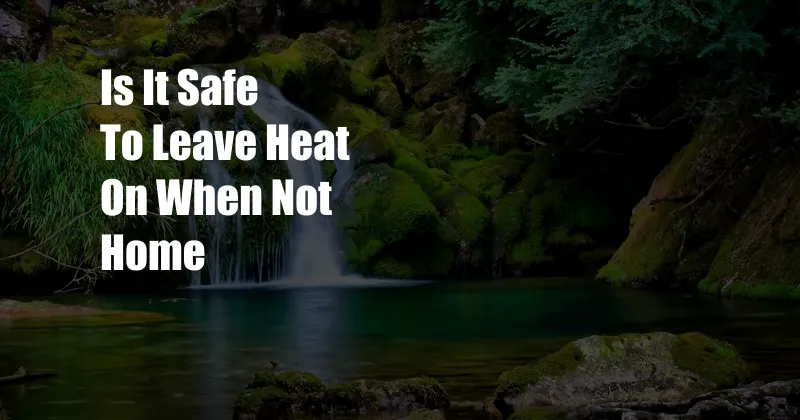
Is It Safe to Leave the Heat On When Not Home?
The winter season can be harsh, and staying warm and comfortable in your home is essential. One common question that homeowners grapple with is whether it’s safe to leave the heat on when they’re not home. This decision can have significant implications for energy efficiency, safety, and your property’s well-being. In this comprehensive article, we’ll delve into the topic and explore the factors to consider, the latest trends, and expert advice to help you make an informed decision.
Leaving the heat on when away from home has been a topic of debate for decades. Some argue that maintaining a consistent temperature prevents pipes from freezing and protects against moisture buildup, while others emphasize the potential for energy waste and fire hazards. Understanding the nuances of this topic will empower you to make a choice that aligns with your specific needs and circumstances.
Safety Concerns: Potential Hazards and Risks
When considering whether to leave the heat on while away, safety should be your paramount concern. A poorly maintained heating system or unattended space heaters pose significant risks:
- Fire Hazards: Electrical faults, gas leaks, and overheated appliances can spark fires. Leaving the heat on unattended increases the likelihood of these hazards going unnoticed, potentially leading to catastrophic consequences.
- Carbon Monoxide Poisoning: Gas-powered heaters produce carbon monoxide, a deadly gas that can be fatal if inhaled. If the heating system malfunctions or ventilation is inadequate, carbon monoxide can accumulate, endangering occupants upon their return.
- Structural Damage: Excessive heat can damage walls, ceilings, and furniture. If the heating system fails or is left on too high, it can cause fires, warping, or even structural collapse.
Energy Efficiency: Balancing Comfort and Conservation
While safety is paramount, energy efficiency is also a crucial factor to consider. Leaving the heat on when away can lead to significant energy waste and increased utility bills:
- Heat Loss: When a home is unoccupied, heat naturally escapes through windows, walls, and the roof. Leaving the heat on continuously compensates for this heat loss, resulting in wasted energy.
- Overheating: An empty house does not require as much heat as an occupied one. Maintaining a high temperature when away can lead to overheating, discomfort upon return, and unnecessary energy consumption.
Tips and Expert Advice from Industry Professionals
To strike a balance between safety, energy efficiency, and peace of mind, it’s essential to follow best practices:
- Install a Smart Thermostat: Smart thermostats allow you to remotely control your heating system, adjust temperatures based on occupancy, and save energy. They can also alert you to potential issues, providing added peace of mind.
- Regular Maintenance: Ensure your heating system is regularly inspected and serviced by a qualified professional. This will minimize the risk of malfunctions and ensure optimal performance.
- Consider a Space Heater: Instead of heating the entire house, using a space heater in the room you’re occupying can be a more energy-efficient option. However, never leave a space heater unattended.
- Set a Lower Temperature: If you decide to leave the heat on, set the thermostat to a lower temperature, around 55-60°F (13-16°C). This helps conserve energy while preventing pipes from freezing.
Frequently Asked Questions (FAQs)
Q: What if I have pets at home?
A: If you have pets, it’s generally recommended to leave the heat on a low setting to prevent them from getting too cold. Ensure they have access to warm bedding and consider pet-friendly space heaters for added comfort.
Q: Is it okay to leave the heat on vacation?
A: While it depends on the duration and temperature of your absence, it’s generally not advisable to leave the heat on high for extended periods. Consider using a smart thermostat to maintain a minimum temperature or utilize a house sitter to check on your property and ensure everything is running smoothly.
Q: What are the risks of turning off the heat completely?
A: Turning off the heat completely can lead to frozen pipes, which can burst and cause significant water damage. It’s essential to maintain a minimum temperature, especially in areas with freezing winter temperatures.
Conclusion
Deciding whether to leave the heat on when not home is a personal choice that requires careful consideration of safety, energy efficiency, and individual needs. By following best practices, utilizing smart technology, and seeking professional advice when necessary, you can make an informed decision that ensures the well-being of your home and its occupants.
Are you interested in learning more about home heating safety and energy conservation? Explore our blog for additional articles, tips, and insights to help you make informed decisions and create a comfortable, energy-efficient living space.